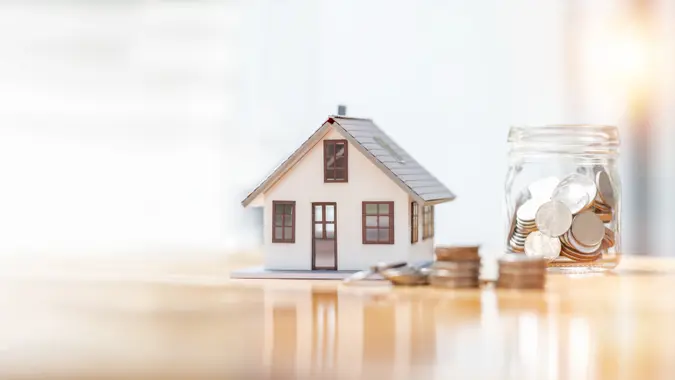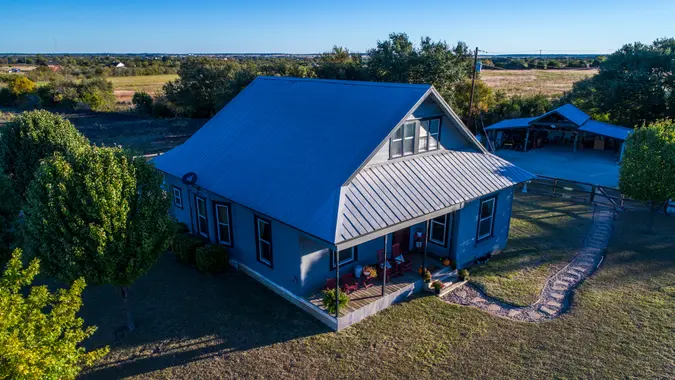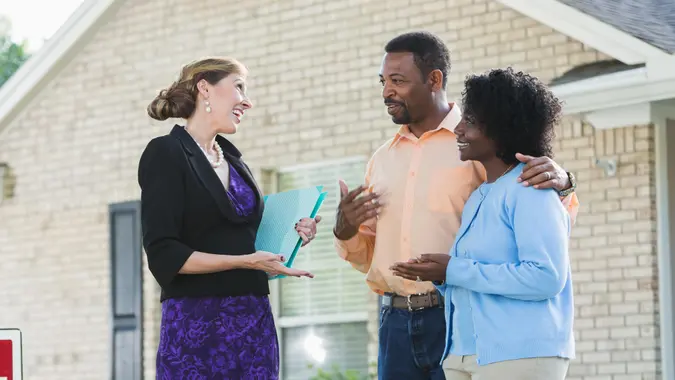I’m a Mortgage Expert: 5 Questions I Can Answer About Getting a Mortgage as a Freelancer

Commitment to Our Readers
GOBankingRates' editorial team is committed to bringing you unbiased reviews and information. We use data-driven methodologies to evaluate financial products and services - our reviews and ratings are not influenced by advertisers. You can read more about our editorial guidelines and our products and services review methodology.

20 Years
Helping You Live Richer

Reviewed
by Experts

Trusted by
Millions of Readers
If you’re a freelancer and plan to buy a home, you could face some additional challenges that those with traditional employment won’t have to deal with. Fortunately, it’s still absolutely possible to get a mortgage as a freelancer, but you’ll need to do some extra planning before you apply for a mortgage.
Here are some answers to common questions freelancers might have about getting a mortgage.
What Challenges Do Freelancers Face When Applying for a Mortgage?
According to Reed Letson, a mortgage broker and owner of Elevation Mortgage, documenting income stability can be a challenge for freelancers.
Since W-2 borrowers have a stable, predictable income that’s easily documented through paystubs, W-2s and a verification of employment, it’s easier for them to demonstrate stable income. Freelancers, on the other hand, must rely on tax returns, bank statements, and profit and loss statements. Then, they must prove that their income is likely to continue consistently.
Letson explained that demonstrating consistency can be the biggest challenge. “I see a lot of freelancers where the income has big swings from month to month and year to year, which are big flags for the underwriter,” he explained. “The ability to repay comes into play when you have inconsistent income.”
How Long Do I Need To Be Freelancing To Be Approved for a Mortgage?
Jennifer Beeston, who Scotsman Guide ranked as the 2024 No. 1 VA loan officer, explained that in most cases, a freelancer will need a two-year income history. Since freelance income varies from month to month, lenders are looking for that substantial history so they can average a freelancer’s income. “In a perfect world, you have two years of filed tax returns,” she said. “A short period of time is not enough for a bank to figure out what the continuity of your income will be.”
While two years of self-employment income is the general rule, Letson explained that there are exceptions. “If the borrower has less than two years but has worked in the field previously, then you may be able to qualify,” he said. “I recently helped a web developer qualify with only 14 months of freelancing because he had over five years’ experience.”
Nonqualified mortgage products, which don’t follow standard agency guidelines, are another option for freelancers who don’t have two years of work history.
“They do come with more stringent standards to protect the lender, such as higher down payment requirements, higher interest rates and lower debt-to-income thresholds,” Letson explained. “But these products are geared toward self-employed freelancers, allowing them to qualify on one year of income through qualified bank statement deposits.”
Though these programs offer more flexibility, income stability is still a main component of the qualification process.
Do I Need To Make More as a Freelancer To Qualify for a Mortgage?
According to Letson, freelancers need more gross income to qualify for a loan than W-2 employees, but that’s only because of the expenses that a freelancer deducts. “In order to calculate the income that can be used to qualify for a self-employed borrower, you take the gross income minus expenses,” he said.
If a W-2 borrower makes $100,000 a year, that full income can be used to qualify for a mortgage. In comparison, if a self-employed freelancer makes $150,000 a year but has $75,000 in expenses, only $75,000 of their income is qualifying income for a mortgage.
If you have substantial expenses, you will need to earn a higher gross income to qualify for a mortgage. Alternatively, if you have minimal expenses, you can still qualify for a mortgage with a lower gross income.
Do I Have a Better Chance of Being Approved If I Already Own a Home?
“Yes, if you already own a home, the chance of getting approved for a mortgage dramatically increases,” Letson said. Making on-time and consistent payments demonstrates your ability to repay your mortgage on a freelance income.
However, freelancers still need to be able to verify their consistent income, especially when upgrading to a larger, more expensive home. “The established credit history helps, but it doesn’t eliminate documentation requirements,” Letson explained.
What Else Can I Do To Maximize My Chances of Being Approved?
Beeston encourages all of her clients to file their tax returns honestly and ethically. “If you have a real expense, show it,” she said. “Don’t ask a lender how much you have to show on your taxes.” Instead, you should be telling a lender how much you make.
Beeston has also heard horror stories of lenders who have told clients to amend their taxes to show certain amounts to increase their chances of being approved. “Lenders are not accountants,” she explained. “If a loan officer is ever telling you that you need to show this much income or to amend your taxes, go get another loan officer. It’s fraud.”
If you plan to apply for a mortgage as a freelancer, Letson recommended you take the following steps to prepare.
- Separate your personal finances from your business finances by using separate bank accounts for each.
- Build up your savings account with cash reserves so you can afford a larger down payment.
- Reduce other liabilities, like outstanding loans, to improve your debt-to-income ratio.
- Work with a mortgage broker who specializes in self-employment borrowers.
“As a self-employed borrower, there are extra hoops,” Beeston said. You’ll need to be able to show your ability to repay your mortgage. You may need to do some extra planning, but you can absolutely still get a mortgage as a freelancer.
 Written by
Written by  Edited by
Edited by 

























